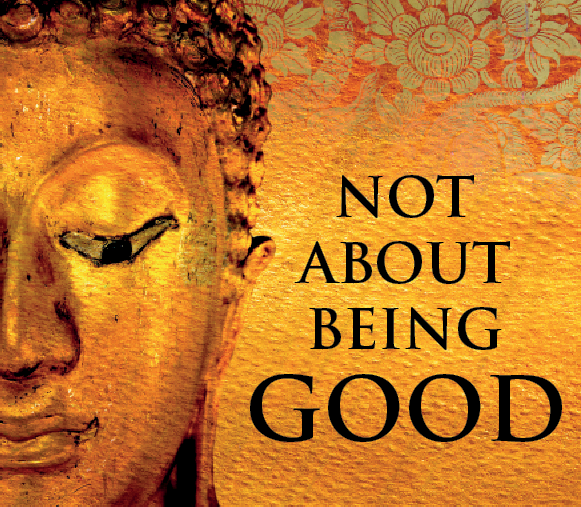Not about being good - understanding Buddhist ethics
by:
Subhadramati
Published:
Monday, June 8, 2015

The trouble with writing about Buddhist ethics is that people often already have strong associations with the concept of ethics – and these are often negative.
One of the negative ways we can think about ethics is perhaps evoked by the story the main character, David Lurie, tells in J.M. Coetzee’s novel Disgrace. It’s the story of a dog - a male golden retriever - that would get excited and unmanageable whenever there was a bitch in the vicinity. Every single time this happened the owners would beat it. This went on until the poor dog no longer knew what to do. Eventually, even at the smell of a bitch, it would chase round the garden with its tail between its legs, whining, trying to hide. It didn’t need to be beaten anymore: it was ready to punish itself. It had become afraid of – and started to hate – its own nature. Lurie’s daughter asks if it wouldn’t have been better to just castrate the dog, which makes Lurie despair even more. He’s sure the dog would have preferred to be shot rather than being ‘fixed’ and spending the rest of its life padding about the living room.
If you think of ethics in these terms, as having to keep your own nature under control, or as something imposed upon you and kept in place by a system of reward and punishment, or, even worse, as having to be ‘fixed’ in order to conform to someone else’s idea of ‘good behaviour’, then it won’t be surprising if you have negative associations.
But Buddhist ethics is very far from the kind of system that makes us suspicious of our own natures, and calls on us to distort our own natures. Buddhist ethics doesn’t see human nature as something that has to be beaten into submission, tamed, or domesticated. Buddhism is about fulfilling our human nature, not diminishing or even crippling it, and Buddhist ethics is both part of the way to that fulfilment and the expression of that fulfilment. The word ‘ethics’ comes from the Greek ‘ethos’, which in modern English can be translated as ‘the character of an individual as represented by his or her values and beliefs’. In Buddhism, being ethical means learning to act more and more in accordance with your values.
It might seem strange to be told that you have to learn to act in accordance with your values. But sometimes it is difficult to know what your own values are. They can get mixed up with the values of some authority or perceived authority; they can get mixed up with conventional assumptions about what morality is; or they can be mixed up with religious rites and rituals.
It’s easy to be unconsciously influenced by ideas about what is normal in a particular group or culture. In these kinds of situations society itself then becomes, without your being aware of it, the ‘authority’ persuading you to conform by rewarding you when you do, and by punishing you when you don’t. The trouble is, because each brand of conventional moral system becomes the norm within the culture, it is easy to take it on unthinkingly. For example in India it would be considered indecent for a husband and wife to hold hands in public but perfectly acceptable for male friends to do so, whereas in the UK or Ireland the opposite is true – a man and a woman can hold hands and even kiss in public, but two men holding hands is considered indecent.
Of course conventional morality may sometimes align with natural morality. The key thing is that, if you want to discover what truly human values are, you’ll have to continually be on the lookout for values that you’ve adopted unthinkingly. These may be to do with what, when, and how you eat; who you sleep with; what you spend your money on; how you bring up your children or care for your elderly parents. In other words, you’ll have to continually be on the lookout for being swayed or influenced by mere convention. If you cultivate this kind of sensibility you’ll find that you clear the way for the growth of what could be called ‘natural morality’.
Natural morality springs out of the awareness that other people are essentially no different from ourselves. They, like us, have hopes, fears, people they care about, and a desire to be fulfilled in life. Crucially, Buddhism recognizes that the potential for this awareness is part of the structure of human consciousness. It’s what we call conscience and it comes with being human. The teachings of Buddhism are not there to generate our moral sense but to lead it out, to educate it. The teachings are necessary because, although they’re innate, our naturally ethical impulses, that is those based on imaginative identification with others, are competing with our other impulses. They become hidden by, or mixed up, with ‘conventional ethics’. They get buried when we allow the opposite tendencies to develop by making certain choices or finding (or putting) ourselves in certain conditions. They get reduced or ‘blunted’ when we don’t make conscious efforts to put them into practice.
Practising the art
So ‘ethics’ is something you can develop and cultivate the way you might develop and cultivate any art or skill. In fact, rather than talking about actions being ‘good’ or ‘bad’, Buddhism talks about them being skilful and unskilful. Actions that are expressions of generosity towards others, love, goodwill towards them, or wisdom are skilful. And those that are expressions of selfishness towards others, ill-will or hatred towards them, or delusion are unskilful.
Buddhism does not provide – or try to enforce – an overarching moral code for everyone collectively to abide by. Instead Buddhism teaches that each of us must take individual and personal responsibility for our actions. This emphasis is quite different from the message we often hear in ‘religious’ arguments, which is that without a framework made up of absolute standards there can be no genuine moral conduct (even though it isn’t hard to observe that not all ‘religious’ people are ‘good’ and not all ‘good’ people are ‘religious’). It can feel liberating – I know it did for me – to discover that practising Buddhist ethics isn’t about avoiding certain proscribed activities, but about developing skilful intentions. However, there’s a challenge involved here too because the only way to learn a skill is by actually practising it – no one else can do that for you.
You could say ethics has three levels. First of all you realize that it’s in your own interests to act unselfishly. You realize that practising ethics will lead to greater happiness and satisfaction for yourself, so you take on the practice in that spirit. There may be a struggle but, as you see the benefits, you become more and more convinced the struggle is worth it.
The second level of ethics springs out of your natural empathy for the world around you and your wish not to cause harm.
In the third and highest level of ethics you no longer experience selfish motivations at all. This involves a complete reorientation of your being. It involves receptivity to those wiser than yourself. It requires commitment. And it involves learning to let go of your instinctive self-referential mode of seeing things, so that you can see things just as they are without ‘you’ in the centre of everything.
Buddhism says it is possible to reach a truly unselfish state of mind and to act from that basis – not just for one day but consistently.
Buddhism describes genuine unselfishness as a dynamic and positive state – a state of unlimited creativity. Practising Buddhist ethics is a step-by-step practical path towards this.
Not About Being Good - Dublin Buddhist Centre Course
A course on Buddhist Ethics will start in the Dublin Buddhist Centre on Thursday 16th June 2015.
For more information on the course please see http://www.dublinbuddhistcentre.org/events/not-about-being-good.htm
A course on Buddhist Ethics will start in the Dublin Buddhist Centre on Thursday 16th June 2015.
For more information on the course please see http://www.dublinbuddhistcentre.org/events/not-about-being-good.htm
About the author:
Subhadramati has been a Buddhist for over twenty-five years and joined the Triratna Buddhist Order in 1995. She worked in Buddhist team-based right-livelihood businesses (a restaurant and a gift-shop) in London and Dublin for seventeen years before starting to work full-time at the London Buddhist Centre. At the LBC she particularly works with women wanting to explore and deepen Buddhist practice, as well as teaching meditation and Buddhism more generally. She lives with eleven other Buddhist women in a residential Buddhist community.
windhorsepublications.com
In Issue:
Latest Issue
Upcoming Events
-
17/04/2020 to 26/04/2020
-
18/04/2020
-
23/04/2020
-
15/05/2020 to 23/05/2020
-
16/05/2020 to 17/05/2020
Recent Articles
Article Archive
- November 2011 (2)
- January 2012 (3)
- February 2012 (2)
- March 2012 (2)
- April 2012 (4)
- May 2012 (4)
- June 2012 (1)
- July 2012 (3)
- August 2012 (2)
- October 2012 (2)

